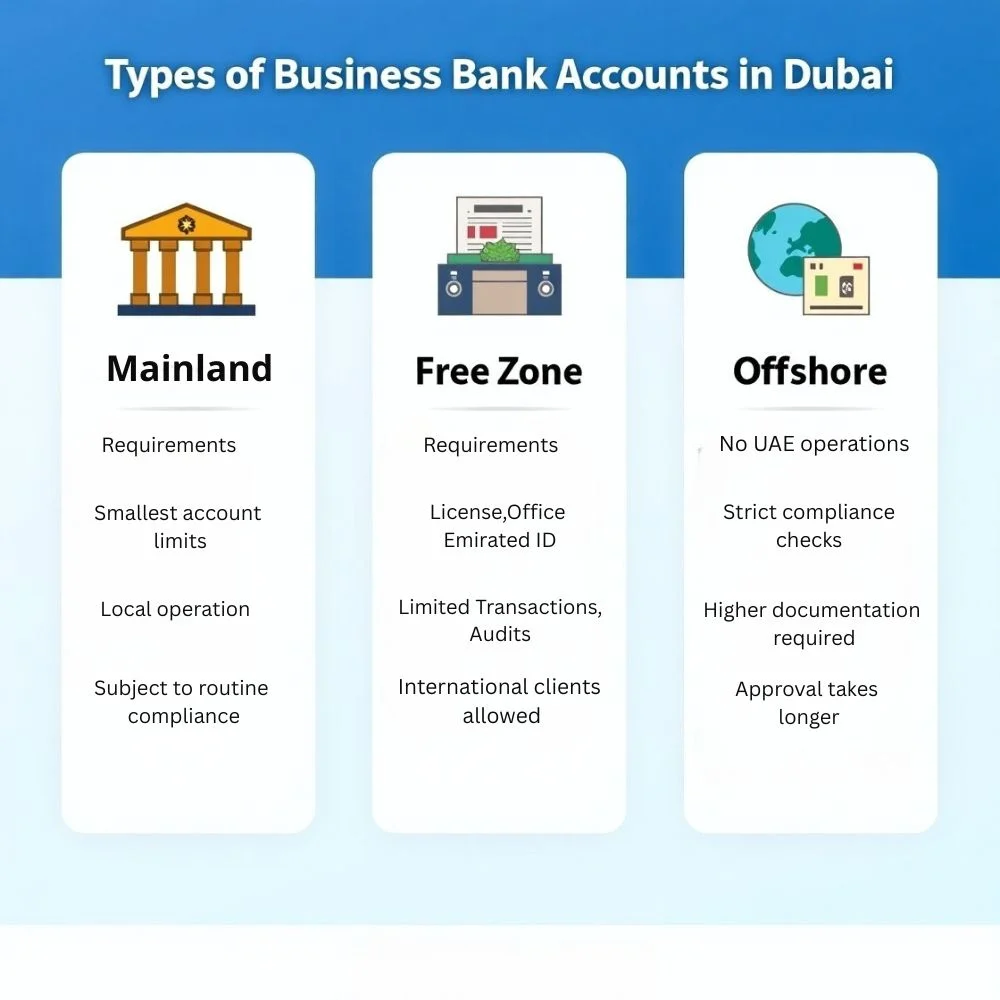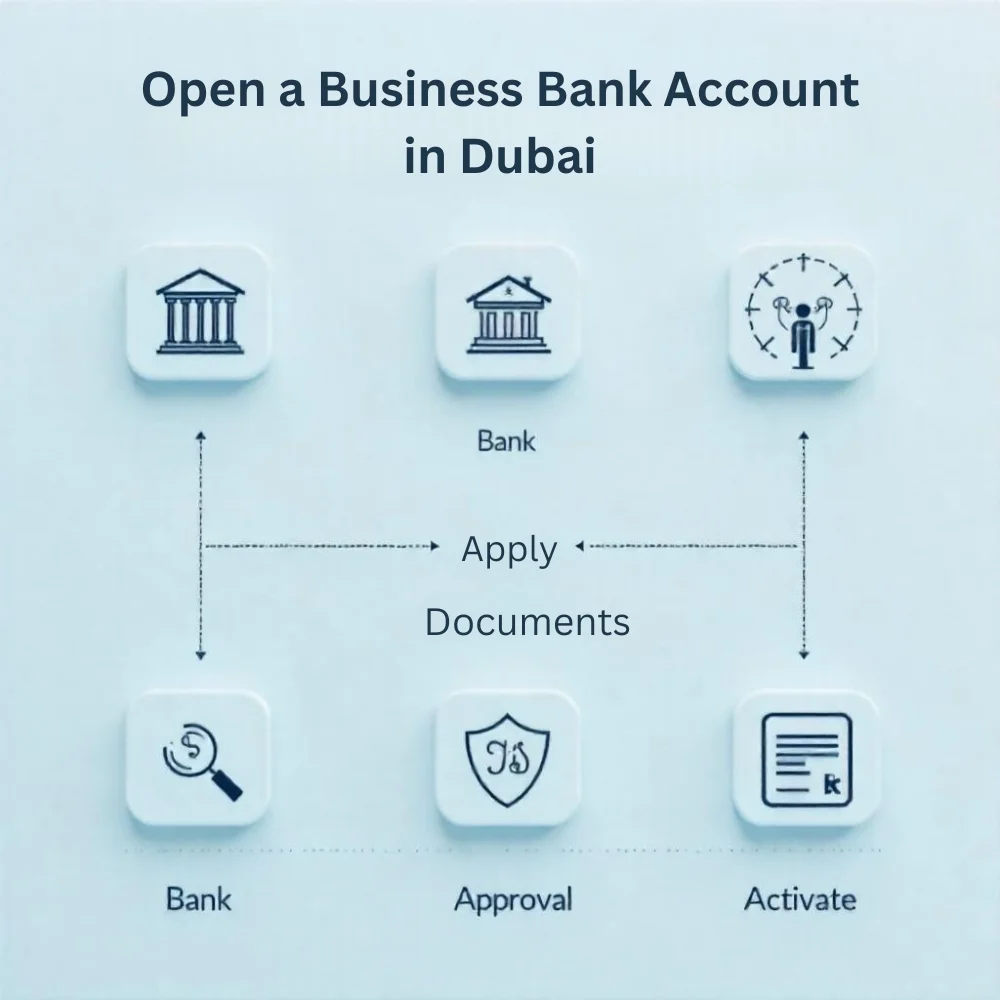
Setting up a business bank account in Dubai is a key part of starting or managing any registered company in the UAE, ensuring financial clarity and legal compliance. In 2025, banks continue to improve their onboarding systems, but strict compliance and documentation are still required. Whether you’re a startup, SME, or free zone company, having a dedicated business account is not only a legal necessity but also a tool that helps streamline your operations, improve financial transparency, and gain credibility with clients.
Why You Need a Business Bank Account in Dubai?
A business bank account in Dubai plays a crucial role in ensuring your company’s legal compliance while also facilitating the smooth management of everyday financial tasks. It enables companies to manage daily transactions, pay salaries, track finances, and distinguish between business and personal expenses. Here’s why it matters:
- Required by law for all registered businesses
- Helps build a credit history for your business
- Makes accounting and auditing easier
- It allows your business to receive payments directly from clients or customers through secure and trackable channels.
- Required for VAT registration and corporate tax compliance
Key Advantages of Opening a Business Bank Account in Dubai
Having a dedicated business bank account in Dubai brings a number of practical and strategic advantages. Beyond legal compliance, it plays a central role in how you run and grow your company.
A major benefit early on is the ability to separate and track your business finances, giving you better control over cash flow and reporting. Keeping personal and business transactions separate helps simplify accounting, ensures smoother audits, and makes it easier to understand your company’s financial health.
It also helps build professional credibility. Suppliers, clients, and partners are more likely to trust and work with businesses that operate through a registered corporate account. It shows you’re serious, organized, and operating within the law.
1. Additional advantages include:
- Access to credit and financing: Once your account is established, many banks offer credit lines, business loans, and overdraft options to support your operations.
- Supports tax compliance: A separate account helps you organize your VAT payments and submit accurate tax filings when required.
- Improves payment processing: Whether receiving customer payments or paying staff, a business account provides smoother and more professional transactions.
- Enables multi-currency handling: Many UAE banks offer the option to receive or hold funds in multiple currencies, which is ideal for international clients or suppliers.
In short, opening a business bank account in Dubai is more than a regulatory requirement; it’s a smart move for stability, reputation, and long-term growth.
Who Can Open a Business Bank Account?
Business bank accounts are available to most UAE-licensed companies, but certain eligibility requirements must be met.
1. Eligibility Criteria
- A valid UAE trade license (Mainland or Free Zone)
- Company incorporation documents
- A physical office lease or an Ejari certificate
- The authorized signatory must be present in the UAE
- Clear business activity and transparent funding sources
Compliance and Regulatory Checks for Business Bank Accounts
When opening a business bank account in Dubai, banks are required to follow strict compliance procedures to meet both UAE laws and international banking standards. These verifications are designed to reduce the risk of illegal activities, including money laundering, financial fraud, and the funding of terrorism.
Banks will typically perform a Know Your Customer (KYC) check, where they review your company’s background, shareholders, source of funds, and intended business activity. This helps them ensure your company is genuine and operating legally.
What banks usually check:
- Shareholder identity and business history
- Business activity and industry classification
- Source and destination of funds
- Office location and proof of actual operations
- Licensing and legal documents
In some cases, banks may also conduct Enhanced Due Diligence (EDD), especially for high-risk industries, offshore companies, or businesses with international transactions. This may involve more in-depth document requests, video calls, or in-person verification.
The UAE Central Bank also mandates regular reporting and periodic account reviews, particularly for companies engaged in cross-border activities or those identified for unusual patterns.
Failing to comply with these regulations can result in delays, account rejection, or even account suspension in the future. That’s why it’s essential to be transparent and have all your documentation in place when applying.

Three Types of Business Bank Accounts in Dubai
When setting up a business bank account in Dubai, your company’s legal structure plays a major role in determining what options you have and what requirements you’ll need to meet. Each type of company, mainland, free zone, or offshore, has different conditions, limitations, and banking flexibility. Understanding the differences helps ensure a smoother account opening process.
- Mainland
- Free Zone
- OffShore
1. Mainland
Mainland businesses usually have the clearest path to opening a bank account because they’re licensed to operate directly in the UAE market.
1. Requirements typically include:
- An active business license issued by Dubai’s Department of Economic Development is required to proceed with account setup.
- A physical office lease (Ejari certificate)
- MOA (Memorandum of Association)
- At least one shareholder or authorized signatory must hold a valid Emirates ID and UAE residency status.
- Company stamp and business activity summary
2. Restrictions:
- Must comply with UAE federal banking laws
- Subject to routine compliance checks and account monitoring
- Required to maintain a minimum balance, varying by bank
2. Free Zone
Free zone entities are popular with startups and small businesses due to easier setup and 100% foreign ownership. However, banks may assess them more carefully if there’s no physical presence in the UAE.
1. Requirements often include:
- Trade license issued by a recognized free zone
- Shareholder documents (passport, visa, etc.)
- Office lease or flexi-desk agreement
- Business plan or overview of operations
- No Objection Certificate (NOC) from the free zone, if needed
2. Restrictions:
- Banks may hesitate if the company only has a virtual office
- May be limited to transacting primarily within the free zone or internationally
- Extra documentation is required if dealing with the local UAE market
3. Offshore
Offshore companies are primarily structured for international operations, which makes banking more complex due to stringent global compliance rules.
1. Requirements may include:
- Certificate of incorporation from an offshore jurisdiction (e.g., RAK ICC or JAFZA Offshore)
- Proof of business activity and source of funds
- Detailed shareholder information and company structure
- Enhanced due diligence paperwork, including KYC forms
- Minimum balance requirement, often higher than other company types
2. Restrictions:
- Cannot carry out commercial activity within the UAE
- Not all local banks are willing to open accounts for offshore entities
- Subject to frequent audits and international compliance checks
- It may take longer to get account approval due to added scrutiny
Documents Required for Account Opening
Preparing your paperwork ahead of time can significantly speed up the process. Here’s a list of commonly required documents:
- Valid trade license
- Passport copies and Emirates ID of shareholders
- Company Memorandum & Articles of Association
- Office lease agreement (Ejari or tenancy contract)
- Utility bill or proof of address
- Business plan or activity overview
- List of existing suppliers, invoices, or contracts (if applicable)
1. Some banks may request:
- VAT registration certificate
- Company stamp
- Source of funding explanation

Steps to Open a Business Bank Account
Opening a business bank account in Dubai involves a few clear steps that businesses must follow to ensure a smooth and successful setup.
- Choose the right bank based on your business type and needs
- Gather the necessary paperwork and fill out the bank’s application form to begin the account opening procedure.
- Apply online or in person
- Meet with the bank’s relationship manager if required
- Wait for internal due diligence and approval
- Receive account details and activate online/mobile banking
Top Banks in Dubai for Business Accounts
Here’s a comparison of popular local and international banks for business accounts in Dubai:
| Bank Name | Account Type | Minimum Monthly Fee | Minimum Balance |
| Emirates NBD | Business Plus | AED 200 | AED 25,000 |
| RAKBANK | Business Current | AED 105 | AED 10,000 |
| Mashreq | Business Value | AED 150 | AED 10,000 |
| HSBC | Business Account | Varies | AED 50,000 |
| Standard Chartered | SME Banking | Varies | AED 50,000+ |
Note: Fees and balance requirements are subject to change. Always confirm with the bank.
1. Tips to Speed Up Approval
Opening a business bank account in Dubai can take anywhere from a few days to several weeks. To avoid delays:
- Ensure documents are clear, up-to-date, and complete
- Avoid inconsistencies in your business description
- Be transparent about your funding sources
- Maintain a physical office presence if required by your license type
- Choose a bank that aligns with your industry and transaction volume
2. Common Mistakes to Avoid
- Submitting incomplete paperwork
- Using a personal account for business income
- Not clarifying the source of funds
- Not maintaining the required minimum balance
- Selecting an account that doesn’t match your company’s scale can lead to unnecessary fees or limitations.
FAQs
1. Do Dubai banks allow companies to open business accounts without a trade license?
In most cases, banks in Dubai require a trade license as proof that your business is legally permitted to operate before they approve a business bank account.
2. Which documents do you need to set up a business bank account in Dubai?
To open a business bank account, you’ll typically need your trade license, copies of the shareholders’ passports, Emirates ID, company incorporation documents, and proof of a physical address, such as a lease agreement.
3. How long does it usually take to open a business bank account in Dubai?
On average, approval can take anywhere from 7 to 20 business days. The duration depends on the bank’s internal review, the completeness of your documents, and the nature of your business activity.
4. What happens if I don’t maintain the required minimum balance?
Most banks in Dubai set a monthly minimum balance for business accounts. If your account falls below this limit, the bank may charge a maintenance fee or apply penalties until the balance is restored.
5. Do you need a physical office to open a business bank account in Dubai?
For mainland businesses, most banks in Dubai expect the company to have a physical office space, supported by a valid Ejari certificate. This helps confirm that the business has an actual presence in the UAE, which is part of the compliance process. Free zone and offshore entities may need to show evidence of operations or a lease agreement, depending on the bank’s policies.
Conclusion
Setting up a business bank account in Dubai in 2025 is straightforward if you understand the process and prepare accordingly. With the right documents, a clear business profile, and bank selection based on your company’s needs, your application is more likely to be approved without unnecessary delays. Whether you’re launching a startup or expanding an existing venture, a reliable bank account forms the backbone of your financial operations in the UAE.
